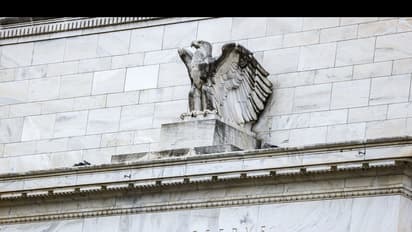US Banking Lobby Groups Reportedly Suing Fed Over Opaque Aspects Of Stress Testing Framework

Synopsis
According to a Reuters report, groups that include the American Bankers Association and the U.S. Chamber of Commerce stated the lawsuit "seeks to resolve longstanding legal violations by subjecting the stress test process to public input as required by federal law.”
U.S. banking lobby groups have reportedly said they are suing the Federal Reserve over "opaque aspects of the stress testing framework.”
According to a Reuters report, groups that include the American Bankers Association and the U.S. Chamber of Commerce stated the lawsuit "seeks to resolve longstanding legal violations by subjecting the stress test process to public input as required by federal law.”
The development comes after the Fed’s Board said on Monday it will soon seek public comments on significant changes to improve the transparency of its bank stress tests and to reduce the volatility of resulting capital buffer requirements.
The Fed said its board intends to propose changes that include disclosing and seeking public comment on all of the models that determine the hypothetical losses and revenue of banks under stress.
It also includes averaging results over two years to reduce the year-over-year changes in the capital requirements that result from the stress test and ensuring that the public can comment on the hypothetical scenarios used annually for the test before the scenarios are finalized.
The central bank also said that for the 2025 stress test, the board plans to take immediate steps to reduce the volatility of the results and begin to improve model transparency. “The Board intends to begin the public comment process on its comprehensive changes to the stress test during the early part of 2025,” it said.
According to a Financial Times report, Greg Baer, president and chief of the industry group the Bank Policy Institute, said, “We appreciate the board’s announcement as a first step towards transparency and accountability, but believe it is necessary to file this suit to preserve our legal rights.”
Following the development, retail sentiment surrounding the Financial Select Sector SPDR ETF (XLF) dipped further into the ‘bearish’ territory (39/100), hitting a 10-month low.
Notably, XLF has gained over 28% since the beginning of the year. The ETF was trading nearly 0.5% higher on Tuesday morning.
For updates and corrections, email newsroom[at]stocktwits[dot]com.<
Stay updated with all the latest Business News, including market trends, Share Market News, stock updates, taxation, IPOs, banking, finance, real estate, savings, and investments. Track daily Gold Price changes, updates on DA Hike, and the latest developments on the 8th Pay Commission. Get in-depth analysis, expert opinions, and real-time updates to make informed financial decisions. Download the Asianet News Official App from the Android Play Store and iPhone App Store to stay ahead in business.